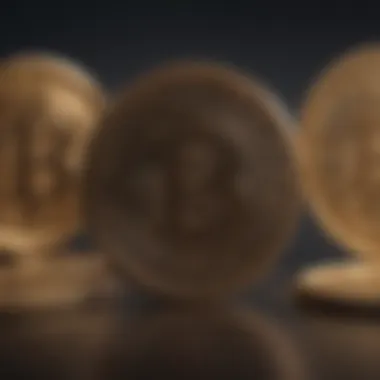Exploring Free Cryptocurrency: Opportunities and Challenges


Intro
In the ever-evolving universe of finance, the concept of free cryptocurrency has emerged as an intriguing opportunity, especially in a world where the cost of living continues to nudge upwards. Understanding this realm not only requires a grasp of digital currency itself but also an awareness of the surrounding issues like security, market fluctuations, and user adaptability.
This phenomenon isn't merely an abstract idea; it’s a tangible reality that anyone with a decent internet connection can explore. By capitalizing on methods such as airdrops, faucets, and reward systems, potential investors can dip their toes into digital assets without risking their hard-earned cash. However, dreams of making a fortune overnight should be tempered with an understanding of the risks involved.
The significance of blockchain technology in this context cannot be overstated. It acts as the backbone of cryptocurrency, providing transparency and decentralization. Yet, along with these opportunities come challenges that need careful navigation. One must be equipped with knowledge, as ignorance in this field can lead to costly mistakes. An informed approach can make the difference between realizing the benefits of free cryptocurrency and falling victim to its pitfalls.
In the following sections, we will delve deeper into the intricacies of acquiring free cryptocurrency, the platforms that stand out, and practical advice for both newcomers and veterans in the field.
Prologue to Free Cryptocurrency
In today’s fast-paced digital landscape, the notion of free cryptocurrency has intrigued many, from casual internet users to seasoned investment gurus. This section highlights the significance of this topic, outlining the key benefits and considerations that come with exploring free cryptocurrencies. With the rise of blockchain technology and the demand for accessible financial tools, understanding how to acquire digital currency without a monetary commitment becomes essential.
The allure of obtaining cryptocurrency for free resonates strongly, especially among beginners who may be cautious about diving into investment waters. Free resources allow users to familiarize themselves with the ecosystem without the pressure that comes from financial risks. Moreover, these opportunities can lead to a deeper understanding of how blockchain and cryptocurrencies function, ultimately encouraging more informed investments in the future.
It’s vital to recognize that while opportunities abound, there are also pitfalls that must be navigated. The landscape of free cryptocurrency can sometimes be treacherous, with scams and misinformation lurking in the shadows of legitimate offers. Therefore, knowing how to distinguish between the two can spell the difference between an enriching experience and one fraught with loss.
From a broader perspective, understanding free cryptocurrency contributions to financial literacy is another critical element. As users engage in acquiring these digital assets, they are not just stacking coins; they are building fundamental knowledge about cryptocurrencies, the technology that drives them, and the economic principles underlying them.
The journey into free cryptocurrency offers various avenues to explore. Whether it involves researching airdrops, understanding mining, or participating in reward programs, this section intends to provide a clear roadmap. Expecting the unexpected is one of the virtues of this terrain. Thus, staying aware of the current landscape becomes crucial, ensuring that opportunities do not come with an unseen cost.
"In the world of digital currencies, nothing is truly free—everything has a learning curve and associated risks."
By diving into the nuances of what free cryptocurrency entails, we lay the groundwork for a thorough and critical examination of both the opportunities and the challenges that accompany it.
Mechanisms for Acquiring Free Cryptocurrency
In the world of cryptocurrency, the phrase "free money" can seem almost too good to be true. However, the mechanisms for acquiring free cryptocurrency are real and present numerous opportunities for both newcomers and experienced investors. Understanding these methods not only enhances knowledge but also expands one’s potential for wealth accumulation without the necessity of a hefty initial investment. Each approach comes with its own set of considerations, allowing users to choose the avenues that align best with their financial goals and risk tolerance.
Airdrops and Giveaways
Airdrops are essentially marketing strategies employed by blockchain projects to distribute free tokens. When a new currency is launched, the issuing company may choose to give away a portion of their tokens to the public as a way to foster user engagement and increase awareness. For instance, if a project is just taking off, it could distribute its tokens to existing holders of an older cryptocurrency, creating a synergy of interest and investment between the two. Individuals often need to perform simple tasks—such as sharing a social media post or signing up for a newsletter—to be eligible for these distributions.
Airdrops can create excitement around a new project, leading to increased demand and trading activity for the coin, potentially boosting its value over time.
Some projects may also hold giveaways, which might range from simple contests to more elaborate games, rewarding users for their participation. Just remember, while these methods can seem like a goldmine, it’s important to be cautious as there are scams lurking at every corner, so always verify the legitimacy of the project before engaging.
Mining and Staking
Mining and staking are two pivotal methods for accumulating cryptocurrency without direct financial outlay, but they operate in very different ways. Mining involves using computational power to solve complex mathematical problems, thus validating transactions on a blockchain network. Bitcoin, for example, rewards miners with newly created bitcoins, making it a popular method for those with access to significant computing resources.
On the other hand, staking is somewhat akin to earning interest on savings. It entails holding a certain amount of cryptocurrency in a digital wallet to support the operations of a specific blockchain. In return for their contribution to the network's security, stakers earn additional coins. This method typically requires a smaller initial investment, making it more accessible to the average user.
In both cases, users should weigh the costs associated with electricity and hardware against the potential rewards.
Participating in Reward Programs


Many blockchain platforms and exchanges have developed reward programs to incentivize user engagement. When users complete specific actions—like trading, providing liquidity, or referring others—they can receive free cryptocurrency. This method effectively combines a user’s everyday activities with opportunities to earn, promoting both increased user interactions and the growth of the platform’s user base.
Some examples of actions that might earn rewards include:
- Completing a certain number of trades within a period.
- Engaging with educational content on various platforms aimed at boosting financial literacy in cryptocurrency.
- Being an active member in community forums, such as those on Reddit or Facebook, which often reward insightful contributions with tokens.
This gamification of the experience can make learning and participating in the cryptocurrency space more enjoyable, while incentivizing users to explore and expand their understanding of the market.
Benefits of Free Cryptocurrency
The landscape of cryptocurrency is ever-evolving, and one of the most compelling aspects is the ability to acquire digital tokens without spending a dime. This opens up a world of possibilities, especially for those who might otherwise feel excluded from the crypto market due to financial constraints. Understanding the benefits of free cryptocurrency is crucial, as it highlights both individual and broader economic implications. Free tokens not only enhance accessibility but also serve as a potential gateway for financial literacy, investment acumen, and market participation. Here's a deep dive into the tangible benefits associated with free cryptocurrency.
Enhanced Accessibility for Beginners
When we talk about accessibility in any field, we usually think about removing barriers. In the realm of cryptocurrency, the notion of free tokens paves a smoother road for newcomers. Traditional investment options often require a hefty sum upfront. Contrast that with cryptocurrencies. Through airdrops, giveaways, or reward programs, beginners can obtain small amounts of digital currency without needing to fork over their hard-earned cash.
A new investor might feel right at home when they nab a few tokens. It's like getting your first taste of something delicious without having to buy the whole meal. This opportunity provides a practical exposure to crypto transactions, wallets, and basic blockchain technology without the intimidating financial commitment.
"Access to free cryptocurrency can be the first step in a much larger journey toward financial independence and savvy investing."
Opportunity for Portfolio Diversification
Diversity is the spice of life, or so the saying goes. In investment parlance, portfolio diversification is not just wise; it's essential. Free cryptocurrency presents investors with a chance to diversify their portfolios without the risk usually associated with new investments. When users receive free tokens, they can include digital coins in their existing investment mix.
This armchair venture into diverse crypto assets can be particularly beneficial. Unlike traditional stocks or bonds, the crypto sector has a wide range of options - from established players like Bitcoin and Ethereum to emerging altcoins. Thus, taking advantage of free tokens could lead to a more balanced portfolio, reducing the overall risk while placing the investor in a prime position to capitalize on future crypto trends.
Stimulation of Financial Literacy
One may not realize it, but acquiring free cryptocurrency often comes hand in hand with knowledge. As individuals begin to research methods of obtaining these tokens, they inadvertently enhance their financial literacy. Navigating through crypto exchanges, understanding how the blockchain operates, or keeping an eye on market trends are all educational exercises.
In an increasingly digital economy, being informed can significantly impact decision-making. More than just trading coins, investors learn about the underlying technology, the importance of security, and the need for strategic planning. It’s a big picture kind of learning that transcends the act of obtaining currency and can change the user's perception of their financial capabilities.
In summary, the benefits of free cryptocurrency extend far beyond mere possession of digital assets. By investing time and effort into understanding these tokens, individuals stand to gain not only financially but also educationally - making the whole venture worthwhile.
Challenges Associated with Free Cryptocurrency
Engaging in the world of free cryptocurrency may sound like a dream come true for many budding investors. However, lurking beneath the surface are several challenges that can quickly turn that dream into a nightmare. Understanding these difficulties is paramount for anyone considering diving into the pool of free digital assets. Grasping these challenges ensures that investors make informed decisions and navigate this wild west of finance with their eyes wide open.
Security and Fraud Risks
The digital nature of cryptocurrencies naturally introduces a host of security concerns. It’s essential to remember that while the blockchain is heralded for its security features, individual users often fall prey to deceitful schemes. Things like phishing scams can hoist unsuspecting individuals right off their crypto-rafts into murky waters. Fraudsters may promise free tokens in exchange for personal information or require users to send a certain amount of cryptocurrency to access free offers.
Moreover, the decentralized aspect of cryptocurrencies means that there is often little recourse for victims of fraud. Unlike traditional banks, which typically have systems in place to handle fraud claims, the world of cryptocurrency operates on a more self-reliant model. One misplaced click could lead to financial losses that are hard to recoup. So, vigilance is not just a suggestion but a necessity.
“In digital realms, the path less traveled is often the road to ruin.”
Market Volatility and Uncertain Value


Investors looking for a stable value when acquiring free cryptocurrency are in for a rude awakening. The market is notoriously fickle, subjecting even seasoned investors to sleepless nights. It’s not uncommon for tokens to fluctuate drastically within short time frames. For someone who acquired tokens as a sort of 'freebie', the uncertainty around valuation can make it challenging to make informed choices about when or if to sell.
Additionally, recent history has shown that tokens can plummet in value overnight due to market sentiment or regulatory news. The anticipation of free digital assets can quickly sour if the market descends into chaos post-acquisition. Therefore, anyone considering entering this space — especially through the route of free assets — should prepare their emotional and financial bearings to account for wild swings in value.
Regulatory Concerns
Regulation, or rather the lack of it, is a double-edged sword in the world of free cryptocurrency. Certain jurisdictions are beginning to cast a wary eye on the burgeoning market, signaling a potential tightening of rules. Consequently, this uncertainty can pose risks not just for new investors but also for more established platforms offering free crypto. The fear of regulatory crackdowns can result in sudden changes to the way tokens are distributed or valued.
Different countries have varying stances on how to treat cryptocurrency. In some places, free tokens might be considered taxable income, while in others, they may operate in legal gray areas. Not being fully aware of the local regulations can lead investors into a quagmire of tax obligations they never anticipated. Such convolutions can make the experience of obtaining free cryptocurrency not just tricky but also fraught with potential legal pitfalls.
In summary, while the world of free cryptocurrencies offers tantalizing prospects for investment and growth, it is riddled with challenges that informed investors must consider. Security risks, market volatility, and regulatory uncertainties loom large in this landscape, making it essential for anyone interested to proceed with caution and thorough understanding.
The Role of Blockchain Technology
Blockchain technology is absolutely pivotal in the world of free cryptocurrency. It underpins the very fabric of how digital currencies operate, ensuring transparency, security, and efficient transactions without the need for traditional financial intermediaries. As we unravel the complexities of free cryptocurrencies, it becomes evident that understanding blockchain is not just beneficial—it is essential.
Understanding Blockchain Fundamentals
To grasp the significance of blockchain, we first need to demystify its core principles. At its essence, a blockchain is a distributed ledger that records transactions across many computers. Instead of relying on a single authority to verify transactions, blockchain disperses this responsibility among network participants. This decentralized approach leads to several crucial benefits:
- Immutability: Once a transaction is recorded on the blockchain, it is virtually impossible to alter. This feature safeguards against fraud and double-spending, giving users confidence in the integrity of their transactions.
- Transparency: Every participant can access the same version of the ledger, fostering transparency. It allows auditors, users, and even regulators to trace transactions without the layers of bureaucracy typically found in centralized systems.
- Security: Advanced cryptographic techniques protect the transactions, making it incredibly challenging for malicious entities to compromise the data. It’s not foolproof, but it raises the bar significantly against hacks and vulnerabilities.
"The promise of blockchain lies in its ability to remove middlemen and streamline processes, fundamentally altering how we exchange value."
Blockchain Innovations Supporting Free Tokens
The landscape of free cryptocurrency continuously evolves, driven by innovative technologies built atop blockchain. New enhancements not only refine existing models but also create novel methods for acquiring digital assets. Here are some key innovations:
- Smart Contracts: These self-executing contracts with the agreement directly written into code offer seamless automation. They can trigger automatic distribution of tokens in reward programs, simplifying processes for both users and platforms.
- Tokenization: This concept encompasses representing real-world assets as digital tokens on the blockchain, opening avenues for fractional ownership. Users can earn these tokens freely through various platforms, making wealth distribution more equitable.
- Layer-2 Solutions: These enhancements, such as the Lightning Network for Bitcoin, allow for faster and cheaper transactions. They help increase adoption by minimizing the barriers associated with free cryptocurrencies, making it easier for users to engage without upfront costs.
In summary, blockchain technology is not merely a technical requirement; it is the backbone of free cryptocurrencies. Understanding its fundamentals provides the keys to unlocking its potential. As innovations continue to appear, they promise to simplify entry points for new users while mitigating risks associated with this digital frontier. The future of free cryptocurrency is thus intricately tied to the evolution and effectiveness of blockchain technology.
Platforms for Accessing Free Cryptocurrency
Accessing free cryptocurrency has become a viable option for many individuals, whether they are just dipping their toes into the digital asset pool or are seasoned players looking to broaden their horizons. The platforms facilitating these opportunities are crucial in this landscape. They not only provide entry points for acquiring cryptocurrency but also lay the groundwork for user engagement and education in the sometimes murky waters of digital currencies. This section dives into two key aspects of these platforms: crypto exchanges and wallets, alongside educational platforms that incentivize learning.
Crypto Exchanges and Wallets
When it comes to acquiring free cryptocurrency, crypto exchanges serve as a critical touchpoint. These platforms facilitate the buying, selling, and trading of digital assets. Several exchanges are known for offering promotions where users can earn free tokens or funds simply for signing up, making small transactions, or referring friends. Examples include Coinbase, which frequently runs promotional campaigns to attract new users, or Binance, which has been known to distribute free tokens during events or to reward users for participation in certain programs.
However, it's not all sunshine and rainbows. While the allure of free cryptocurrency can be compelling, there are essential factors to consider:
- Security: Always check how the exchange secures your data and funds. High-profile hacks have occurred, and some exchanges are more secure than others.
- Fees: Some exchanges may charge hidden fees that can erode the value of your free tokens. It's vital to read the fine print before getting on board.
- User experience: Will you be bombarded with ads and confusing interfaces? Or will it feel smooth and intuitive? The importance of a user-friendly environment cannot be overstated, especially for beginners.
In addition to exchanges, cryptocurrency wallets play an indispensable role in accessing and managing free tokens. Wallets can be hardware-based or software-based, and they help users store their digital currency securely. Some wallets may even reward users with free tokens for holding certain cryptocurrencies, creating further incentives to engage with the digital asset community.
Educational Platforms and Incentives


Beyond exchange platforms, educational resources play a pivotal role in the ecosystem of free cryptocurrency. Websites like Coinbase Earn allow users to learn about different cryptos and earn free tokens in return for completing educational modules. This model not only incentivizes learning but demystifies the complexities that can often put novices on the back foot.
There are several advantages to utilizing these educational platforms:
- Knowledge Enhancement: Users gain a deeper understanding of the technologies and market behaviors that underpin the cryptocurrency landscape.
- Accessible Learning: Many of these resources come at little to no cost, making financial education achievable for a wider audience.
- Practical Engagement: By coupling education with real-world application, the idea of investing in cryptocurrency becomes less abstract and more straightforward to navigate.
In summary, the platforms for accessing free cryptocurrency are far more than mere gateways; they are essential components of the digital currency ecosystem. From crypto exchanges that fuel trading and token distribution to educational resources that empower users, these platforms carry immense weight in shaping future engagement with cryptocurrency and fostering a financially literate community.
"Knowledge breeds confidence, and confidence breeds success in the sprawling world of cryptocurrency."
Navigating these platforms with awareness and savvy can unlock doors to a wealth of opportunities in the dynamic and increasingly accessible domain of free cryptocurrency.
Future of Free Cryptocurrency
The landscape of free cryptocurrency is ever-evolving. As innovative technologies emerge and more people delve into digital assets, understanding where this sector is heading becomes vital. The future of free cryptocurrency isn't just about obtaining tokens at no monetary cost; it's also about how these tokens fittingly integrate into the broader financial environment.
Emerging Trends in the Market
One can hardly overlook the surge of interest in decentralized finance (DeFi) initiatives. Platforms like Uniswap and Aave are breaking traditional models, allowing users to earn free tokens by lending or staking their assets. Participating in liquidity pools, for instance, enables users to receive rewards without requiring large investments. This budding sector aligns with the ethos of free cryptocurrency, democratizing access to wealth and fostering innovative financial opportunities.
Several other trends worth noting include the exponential growth of non-fungible tokens (NFTs) and the rise of community-driven projects. Many startups are rewarding users through community participation—be it via governance tokens or engaging in protocol activities—these approaches may not demand upfront capital but offer ways to earn valuable assets.
"To know where we are going, we must reflect on where we've been. The world of free cryptocurrency is just that; an unmarked path charted by innovators and users alike."
Potential Regulatory Developments
As the popularity of free cryptocurrency grows, so does the scrutiny from regulatory bodies. Governments worldwide grapple with how to manage cryptocurrency—balancing innovation, user safety, and potential criminal activities. Emerging regulations could reshape how projects distribute tokens for free.
For instance, anti-money laundering (AML) laws may impact how airdrops and giveaways are conducted. A stricter compliance framework could make it necessary for recipients of free cryptocurrencies to verify their identity, thereby diminishing the element of anonymity that many users cherish.
Additionally, as tax regulations evolve, they might affect how individuals report their earnings from free tokens, leading to a more structured but potentially cumbersome landscape.
Investors and users should be aware of these impending changes as they could influence not just their current strategies, but also their long-term plans. The question emerges: will the ease of acquiring free cryptocurrency adapt to new challenges, or will it become a maze of compliance and regulations?
Overall, staying informed on regulatory trends will be crucial for anyone looking to navigate the future of free cryptocurrency.
Ending
The discussion around free cryptocurrency has surfed the waves of curiosity and innovation, showcasing its multifaceted nature in both markets and minds. This conclusion will draw together the essential insights presented throughout the article, emphasizing the opportunities and challenges inherent in the realm of free digital currencies.
Summary of Insights
In recent years, the idea of acquiring cryptocurrency without a financial outlay has ignited a fire of interest among both novice and experienced investors. Key mechanisms like airdrops, mining, and participation in reward programs provide pathways for individuals to dip their toes into the digital asset pool. It's fascinating how this approach lowers barriers, making these lucrative opportunities more accessible.
However, it's crucial to note that along with the potential rewards come significant challenges. Security and fraud risks loom large, while market volatility poses a genuine concern. Regulatory issues also continue to hang like a dark cloud over the landscape, threatening to impact gains and accessibility in unpredictable ways.
"The decentralized nature of cryptocurrency emboldens users, yet invites caution due to its inherent risks."
Overall, the exploration of free cryptocurrency unravels the intricate balance between opportunity and caution, making it clear that while advantages abound, one must navigate wisely through the stormy seas of digital finance.
Final Thoughts on Financial Literacy Implications
As more individuals engage with free cryptocurrency, the importance of financial literacy becomes increasingly evident. Understanding the basics—grasping concepts like blockchain technology, wallets, and trading platforms—enables users to make informed decisions, reducing the likelihood of falling victim to scams. But literacy isn't just about avoiding risks; it’s also about recognizing opportunities for diversification and investment growth.
In this regard, educational platforms and community resources play pivotal roles. They provide the necessary knowledge and tools required for individuals to thrive in the cryptocurrency space. Confident users are likely to explore more, experiment, and ultimately contribute positively to the evolving financial ecosystem.



